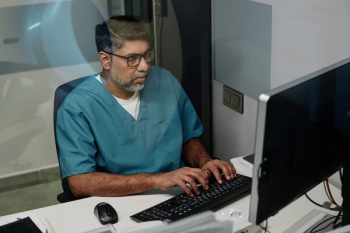
Predicting the Unpredictable
Can you really plan for everything?
I’ve mentioned in
So it was that, about a week prior to writing this column, my grand plan on a Sunday was to go running around midday, and then settle in for a lazy, sunny soak in the pool. The weather forecast was about as favorable as could be, so off I went.
But by the far end of my running-course (3-3.5 miles from my house), some threatening clouds had developed, but they were comfortably to the north, and weather in these parts tends to move north and east, which was away from me. As I progressed, every now and then I got another glimpse of that part of the sky, and thought, is that stuff coming closer?
Then I heard a nearby golf course’s tornado-warning siren going off. Never heard one of those before, but the message got through to me pretty loud and clear. I was headed back towards home anyway, so no change of course was needed-although I did find reserves of speed I don’t usually possess that late in my run. Meanwhile, my sunlight had gone, and I got one more glimpse of the northern sky, which now contained some downright-scary cloud formations of far greater proximity than before.
Some torrential rain, hail, gusting winds, and adrenal-gland convulsions later, I was soaked but also safe and sound back at home. Along with gratitude that I was alive and intact, my mind was abuzz with insistent questions: Was there any way I could have predicted this? Had I needlessly imperiled myself?
Being a perfectionist or control-freak can engender an attitude that one should be ready for anything, and/or have A, B, even C plans for every contingency. Being caught flat-footed by unforeseen circumstances is thus fertile ground for self-flagellation.
Even for those without such inherent tendencies, working in certain capacities (such as a physician providing healthcare), has a way of developing such an outlook. If an occasional doc is Zen enough to avoid adopting an “I’d better be prepared for anything” attitude, the rest of the healthcare system is ever-ready to exert such expectations upon him/her. Including patients who, understandably, expect diagnostic and therapeutic success and, unfortunately, some predatory legal types who are always willing to argue that a given physician could/should have done more, no matter what curve-balls fate chose to throw.
There isn’t much of a downside to such self-preparation: Rather than trying to predict exactly what will happen and being ready for only that set of circumstances, why not be poised for multiple possible outcomes? Even if a contingency-plan doesn’t need to be executed today, it might be tomorrow, next week, or next month. Get accustomed enough to crafting such game-plans when you’re not in the heat of the moment, and the practice might just help for when you truly are caught by surprise: Your mind has gone through the paces enough times in the abstract that it’s bound to be at least a little more capable with improvisation.
A more passive type of preparation is of equal if not greater value: Having surpluses of personnel, finances, and supplies makes an operation more robust when trouble comes along. Even intangibles such as time. An imaging-center that double- and triple-books all appointment-slots, for instance, is going to have no capacity for handling it when a nearby referrer suddenly wants to send over a bunch of patients (say, for instance, his in-office sonographer took ill).
Borrowing some military lingo, we might consider the contingency-plan stuff mentioned above to be prepping for “known” scenarios. Shoring up reserves could therefore be making ready for the “known unknown,” meaning that we know we can’t list all of the things that might come up to tax our resources, so best to have some cushioning in place.
The “unknown unknown” would be stuff that’s so far off the radar that we might never think of it until it happens. There was a well-worthwhile book dedicated to the subject, The Black Swan (no, nothing to do with the ballet-movie). Once the unforeseen happens, of course, it becomes something we’ve experienced and can subsequently prepare for, assuming we survive the first encounter.
One can try to “think outside the box,” and prepare for such things. In so doing, there’s potential for being considered a crackpot, in the same boat with Doomsday preppers, since these are things that have not occurred to other folks as being realistic issues. They might also consider such preparation as a waste of time and resources, making ready for something they consider highly unlikely or impossible to happen. And it’s worth noting that too much preparing for things that might never happen can indeed be wasteful, or result in a type of “analysis paralysis,” planning so much for what’s not happening that one gives short shrift to what actually is.
At the very least, simply taking it to heart that the unpredictable can and will occur is worthwhile in and of itself. Being ready to size up and react to a novel situation is far more adaptive than panicking and flailing ineffectively. (Even if reacting just means running faster to get to shelter when tornado-spawning weather comes a-calling.)
Newsletter
Stay at the forefront of radiology with the Diagnostic Imaging newsletter, delivering the latest news, clinical insights, and imaging advancements for today’s radiologists.












